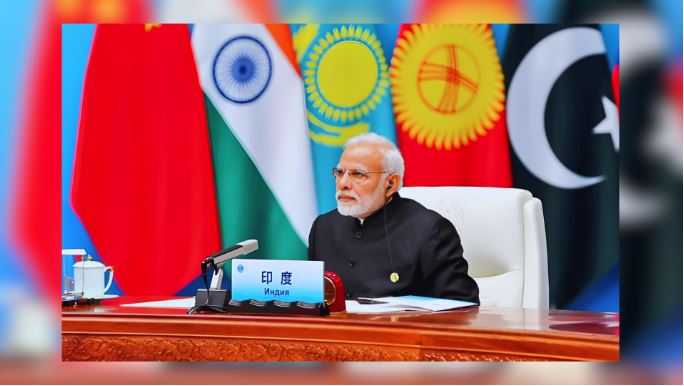
At the recent Shanghai Cooperation Organisation (SCO) summit held in Astana, External Affairs Minister S. Jaishankar, on behalf of Prime Minister Narendra Modi, accused Pakistan of harboring terrorists and providing safe havens for terrorism. This narrative is not new and aligns with India’s long-standing position on cross-border terrorism. However, these accusations overlook Pakistan’s own victimhood and the complex security challenges it faces, especially from groups operating out of Afghanistan.
During the SCO summit, PM Modi’s message, delivered by Jaishankar, called for the international community to isolate and expose countries that condone terrorism. Modi emphasized that terrorism in any form cannot be justified, stressing the need for a decisive response to cross-border terrorism and robust measures against terrorism financing and recruitment.
Jaishankar echoed these sentiments, highlighting the importance of combating terrorism as a core goal of the SCO. He underscored that unchecked terrorism could pose a major threat to regional and global peace, necessitating collective international action. This stance has been a consistent feature of India’s foreign policy, particularly concerning Pakistan. Contrary to Jaishankar’s assertions, Pakistan has been a significant victim of terrorism. The country has faced numerous terrorist attacks, resulting in substantial loss of life and socio-economic disruption. Many of these attacks have been attributed to groups operating from Afghanistan, exacerbating Pakistan’s security challenges.
Pakistan’s government and military have undertaken extensive counter-terrorism operations to combat these threats. Operations such as Zarb-e-Azb and Radd-ul-Fasaad have been launched to dismantle terrorist networks and restore peace in the country. These efforts have been recognized internationally, although challenges remain due to the volatile situation in neighboring Afghanistan. Jaishankar’s accusations are part of a broader historical narrative between India and Pakistan. The two nations have had a contentious relationship since their independence in 1947, with several wars and ongoing border skirmishes. The issue of terrorism has been a significant point of contention, with both sides accusing each other of supporting terrorist activities.
India’s stance has often focused on Pakistan’s alleged support for groups like Lashkar-e-Taiba (LeT) and Jaish-e-Mohammed (JeM), which have been involved in attacks on Indian soil. Conversely, Pakistan points to the militant groups operating in Afghanistan that target Pakistani civilians and security forces. This mutual distrust complicates efforts for regional cooperation and peace. Pakistan’s counter-terrorism measures have involved significant military and intelligence operations. Operation Zarb-e-Azb, launched in 2014, targeted militant strongholds in North Waziristan, a region bordering Afghanistan. The operation aimed to eliminate terrorist infrastructure and has been credited with reducing terrorist incidents within Pakistan.
Following Zarb-e-Azb, Operation Radd-ul-Fasaad was initiated in 2017 to consolidate the gains made and prevent the resurgence of terrorist elements. This operation focused on eliminating residual terrorist networks and addressing the ideological roots of extremism through de-radicalization programs. These efforts reflect Pakistan’s commitment to fighting terrorism, despite the challenges posed by its geopolitical environment. The country’s security forces have paid a high price in terms of casualties, underscoring the severity of the threat they face.
The security situation in Afghanistan has a direct impact on Pakistan’s internal security. The presence of militant groups like the Tehrik-i-Taliban Pakistan (TTP) in Afghanistan poses a significant threat to Pakistan. These groups have carried out numerous attacks in Pakistan, exploiting the porous border and the difficult terrain. Pakistan has repeatedly called for a stable and peaceful Afghanistan, recognizing that instability in its neighbor directly affects its own security. The withdrawal of US troops from Afghanistan and the subsequent rise of the Taliban have further complicated the security dynamics, with fears of increased militant activity spilling over into Pakistan.
While India continues to accuse Pakistan of supporting terrorism, the international community has recognized Pakistan’s efforts in combating terrorism. Various countries and international organizations have acknowledged the sacrifices made by Pakistan in the fight against terrorism and the progress achieved through its military operations. However, there is a need for greater international cooperation to address the root causes of terrorism in the region. This includes stabilizing Afghanistan, promoting regional dialogue, and supporting counter-terrorism initiatives that address both immediate threats and long-term challenges.
The accusations made by Jaishankar at the SCO summit reflect India’s ongoing concerns about terrorism. However, these allegations must be viewed in the context of Pakistan’s own victimhood and the complex security environment it navigates. Pakistan has faced significant terrorist threats, particularly from groups operating out of Afghanistan, and has undertaken extensive efforts to combat these challenges. For meaningful progress in combating terrorism, there is a need for a balanced approach that recognizes the efforts and sacrifices of all countries involved. Regional cooperation, supported by international engagement, is essential to address the multifaceted threat of terrorism and promote lasting peace and stability in South Asia.
